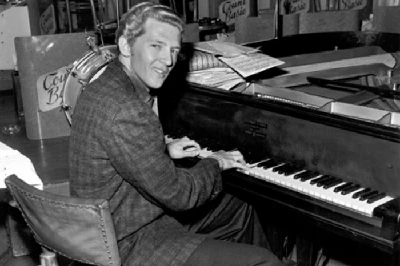published: 13 /
3 /
2012

With a new four CD compilation 'A Whole Lotta Jerry Lee' about to be released, Cila Warncke reflects on the career of the legendary Jerry Lee Lewis
Article
‘Great Balls of Fire’ and ‘married his 13-year-old cousin’: that’s all many people know about Jerry Lee Lewis, aka The Killer. ‘A Whole Lotta Jerry Lee’ goes a long way towards making up the knowledge deficit in musical terms but it leaves a whole lot unsaid on the more compelling topic of why Mr Jerry Lee did the things he did.
As a purely musical artefact this four CD compilation, with its hundred-plus tracks, 70-page biographical booklet by rock historian Roger Dopson, and sturdy triple fold box, can rightly claim to be “The Definitive Retrospective”. Ranging from hits like ‘Whole Lotta Shakin’ Goin’ On’ and ‘Roll Over Beethoven’ to country staples like ‘Sweet Georgia Brown’ and ‘There Must Be More to Love Than This’ Lewis’ skips from familiar rock ‘n’ roll territory to country, blues and even gospel. ‘Me and Jesus’ (a duet with country-star sister Linda Gail Lewis) might seem an incongruous sentiment from a self-professed proponent of the devil’s music but therein lies the paradox of Jerry Lee Lewis.
Born to sharecropper parents in rural Louisiana Jerry had an instinctive gift for music and performance. When he was just eight his father mortgaged the family home to buy a second-hand piano which, according to Dopson, the boy played eight or nine hours a day. To what extent this enthusiasm was propelled by his father having literally bet the house is a moot point. But it is worth considering the emotional implications of such parental generosity. Poverty casts long, peculiar shadows.
Jerry Lee’s mama wanted the best for him and enrolled him in Bible College. He promptly got kicked out for playing boogie-woogie in a church assembly. The teenage black sheep started playing in local clubs and auditioned unsuccessfully for the Grand Ole Opry. In 1956, age 21, he set off for Memphis and cut his first record for Sun Studio. His musical and personal life took separate trajectories: on the one hand he was cutting records with Carl Perkins, Elvis and Johnny Cash, recording hits, wowing audiences and wooing women. On the other hand, Lewis was convinced his raunchy tunes were dragging himself and his audience straight down to hell.
He was just 22 and already had a couple of divorces under his belt when he wed 13-year-old Myra Gale Brown, the daughter of his first cousin. The scandal clogged his engines sending his career into a flat spin. But his fall from grace says more about the gulf between poor white Southern culture (13 is still the age of consent in Louisiana) and middle class Northern mores than it does about Jerry Lee’s moral character. Public outrage notwithstanding, Jerry and Myra were married for 13 years – the longest-lasting but one of his six marriages. The Killer fought back the only way he knew how: by “playing a little boogie-woogie on this here pee-ya-nuh.”
Listening to ‘A Whole Lotta Jerry Lee’ chronologically gives a clear sense of his strengths and weaknesses. ‘Johnny B Goode’ played guitar ‘just like ringing a bell’; Jerry Lee plays piano like a whole bell choir. Unleashed on songs like ‘Chantilly Lace’ and ‘Big Boss Man’ the notes leap like electrified cats, spitting fire and energy into the spaces between bone and sinew. Give Jerry a piano and some mildly risqué lyrics and he’ll have you grinning all night long (I defy anyone to listen to ‘Lewis Boogie’ or ‘She Was My Baby (He Was My Friend)’ and not pop like a corn kernel) , but his talent runs deep, not broad. His version of ‘Me and Bobby McGee’ loses the mournfulness of Kris Kristoffersen’s original and the raw soul of Janis Joplin’s cover in a gallop of inappropriate key licks. This happens more than once. It’s like Jerry Lee never got comfortable with emotions, not even in songs, and when confronted with them he turns into a wild-eyed kid, flailing his way through what he doesn’t understand.
This may explain why, despite his enormous talent, Jerry Lee Lewis doesn’t enjoy the reverence accorded to contemporaries like Johnny Cash. The Man In Black screwed up a lot, but he grew up too, and so redeemed his marginal years. Twice widowed, and with two sons dead by misadventure, Lewis has seen more than his share of sorrow. But there is nothing in ‘The Complete Retrospective’ that suggests a personal evolution to compare to Cash’s arc from pill-popping hellraiser to archetypal ‘American Man’. Come triumph or tragedy Jerry just keeps on shakin’ at his piano.
Picture Gallery:-
